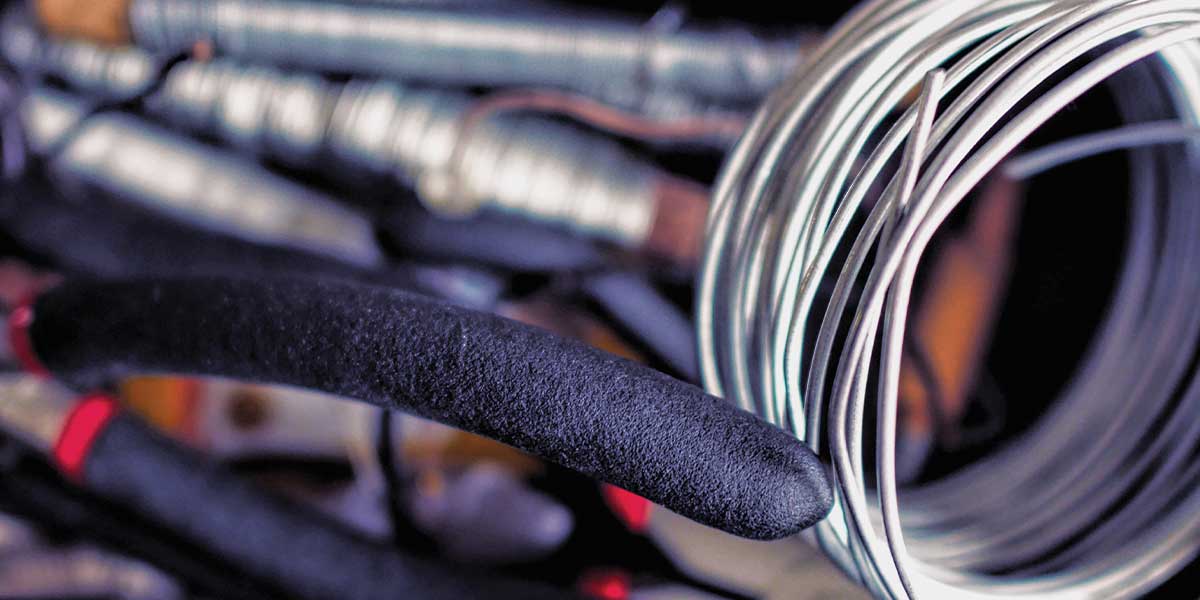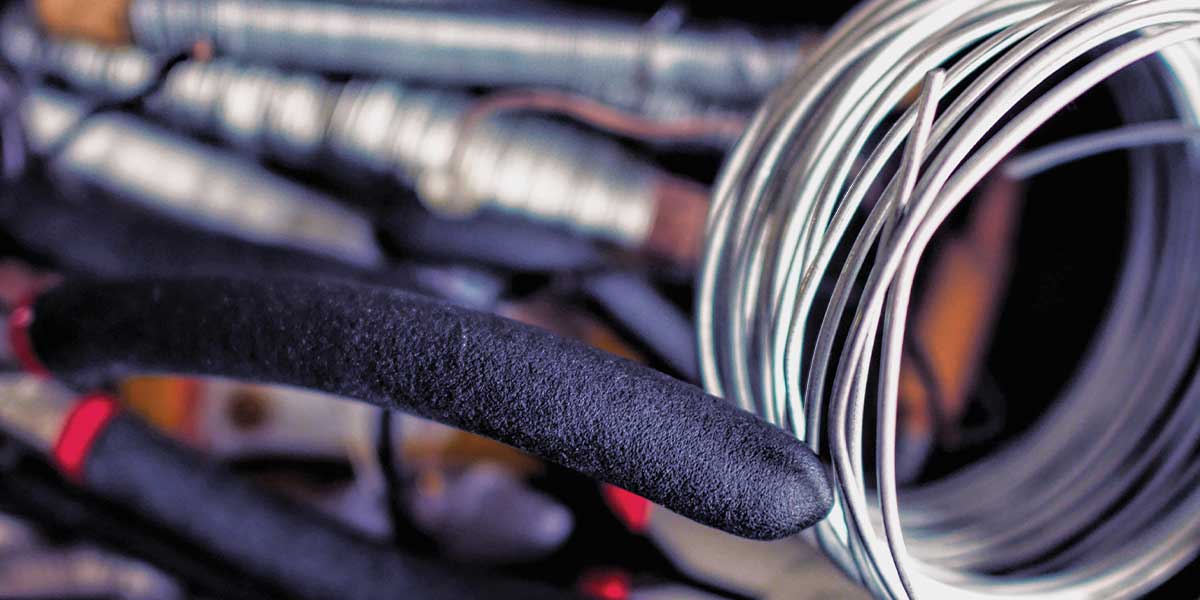Understanding The Dangers of Aluminum Wiring in Your Home
When was the last time you thought about the wires running behind your walls? If your home was built or renovated between the 1950s and 1970s, you could be living with aluminum wiring, an outdated electrical system posing hidden hazards. Many homeowners are unaware of the dangers of aluminum wiring until something goes wrong from flickering lights to, in worst-case scenarios, electrical fires.
At Expert Electric, we believe that knowledge is power and safety. This comprehensive guide will help you understand the dangers of aluminum wiring, its risks, warning signs, and why immediate professional assessment is essential for your home’s safety and insurance compliance.
What is Aluminum Wiring?
During the 1960s and early 1970s, copper prices skyrocketed. Builders sought alternatives, leading to widespread use of aluminum wiring in residential construction. Aluminum is lighter and cheaper than copper, and its conductivity made it an attractive option at the time. However, decades of research and real-world experience have revealed the dangers of aluminum wiring that far outweigh its initial benefits.
Why Was Aluminum Wiring Popular?
-
Cost-effective: Aluminum was significantly cheaper than copper.
-
High conductivity: While not as efficient as copper, aluminum could carry electrical current sufficiently for household use.
-
Lightweight and flexible: Easier to install in long runs without sagging.
Unfortunately, these benefits came at a price homeowners continue to pay today due to the dangers of aluminum wiring.
The Hazards and Dangers of Aluminum Wiring
1. Physical Vulnerability
Aluminum is softer than copper, making it more prone to:
-
Nicks or cuts during installation or repairs
-
Damage under pressure or repeated bending
-
Exposure that leads to dangerous live wires
2. Oxidation and Poor Conductivity
One of the biggest dangers of aluminum wiring is its tendency to oxidize rapidly. When exposed to air, aluminum forms an oxide layer that is not conductive. This means:
-
Electricity flow is reduced or interrupted
-
Increased resistance causes overheating
-
Overheated wires can ignite surrounding materials, causing electrical fires
In contrast, copper oxide remains conductive, making copper wiring much safer for consistent electrical flow.
3. Thermal Expansion and Contraction
Another critical factor contributing to the dangers of aluminum wiring is its high thermal expansion rate. Aluminum wiring expands and contracts more than copper when heated and cooled, leading to:
-
Loose connections at outlets and switches
-
Increased risk of electrical arcing (sparks)
-
Greater potential for electrical fires due to overheated connections
Warning Signs of Aluminum Wiring Problems
If you live in a home built during the aluminum wiring era, watch for these warning signs indicating the dangers of aluminum wiring:
Flickering or Dimming Lights
Unexplained flickering or dimming could be a sign of loose or oxidized aluminum connections, disrupting electricity flow.
Warm or Discolored Outlets and Switches
Outlets or switches that feel warm to the touch or show discoloration are clear indicators of overheating, a dangerous fire hazard.
Smoke, Sparks, or Burning Smells
If you notice smoke, sparks, or a burning smell when using electrical appliances, this is a severe safety concern requiring immediate professional inspection.
Frequent Tripping Breakers
Circuit breakers tripping repeatedly may indicate underlying wiring problems or overloaded circuits due to poor conductivity.
Static or Interference in Electronics
Electronic devices such as televisions, radios, or computers experiencing interference or static could be due to arcing within aluminum wiring connections.

Why Aluminum Wiring is a Fire Hazard
Research shows homes with aluminum wiring are 55 times more likely to have fire hazard connections than homes with copper wiring. This stark statistic underscores the dangers of aluminum wiring. Its expansion, oxidation, and physical weakness create the perfect storm for overheating and electrical fires.
For a detailed technical breakdown of these hazards, read this U.S. Consumer Product Safety Commission official report on aluminum wiring hazards and repairs (PDF). This resource provides authoritative guidance on identifying and mitigating aluminum wiring dangers.
Solutions to Mitigate The Dangers of Aluminum Wiring
1. Full Replacement
Replacing aluminum wiring with copper is the safest long-term solution, eliminating risks entirely. However, this option is often costly and invasive.
2. COPALUM Crimp Connectors
The CPSC recommends COPALUM connectors, which permanently bond aluminum to copper, preventing overheating and loose connections.
3. Alumiconn Connectors
Alumiconn connectors are an approved alternative, offering a safe, effective retrofit solution for aluminum wiring without complete rewiring.
For more in-depth homeowner guidance, visit InterNACHI’s Aluminum Wiring Inspection and Safety Guide. It explains identification, risks, and approved solutions in practical detail.
Why Hire Professional Electricians for Aluminum Wiring Inspections?
Attempting DIY fixes on aluminum wiring is extremely dangerous. Only licensed electricians have the tools, training, and certification to:
-
Conduct thorough safety inspections
-
Identify hidden oxidation or arcing
-
Install certified connectors or replace wiring safely
-
Ensure compliance with insurance requirements and electrical codes
Expert Electric: Your Trusted Partner in Electrical Safety
At Expert Electric, we prioritize your safety, comfort, and peace of mind. Our team of licensed electricians is experienced in identifying and resolving the dangers of aluminum wiring, providing you with:
✔️ Professional expertise
✔️ Safety-first solutions
✔️ Transparent recommendations
✔️ Long-term electrical reliability
FAQs
Q: Is aluminum wiring illegal in Canada?
No, it is not illegal, but it is considered outdated and dangerous. Modern electrical codes recommend copper wiring due to its superior safety and performance.
Q: Does aluminum wiring affect home insurance?
Yes, many insurers require aluminum wiring to be inspected or replaced before issuing or renewing policies due to its fire risks.
Q: Can I repair aluminum wiring myself?
No. Aluminum wiring requires specialized tools, materials, and certifications to repair safely. Always hire licensed electricians like Expert Electric to handle these repairs.
Q: How do I know if my home has aluminum wiring?
Homes built between 1960 and 1975 are most likely to have aluminum wiring. A professional inspection is the only way to confirm and assess its condition safely.
Final Thought
The dangers of aluminum wiring are real and serious. From oxidation risks to fire hazards, outdated aluminum wiring endangers your family and property. Staying proactive with inspections and professional solutions is the only way to guarantee electrical safety and insurance compliance.
At Expert Electric, we combine decades of expertise with a commitment to protecting what matters most, your home and loved ones. Don’t wait for warning signs to escalate. Secure your home’s electrical system today.
Contact Expert Electric
Ready for peace of mind?
📞 Call Us Today: 604-681-8338
📧 Email Us: info@expertelectric.ca
Expert Electric. Your Safety is Our Expertise.


